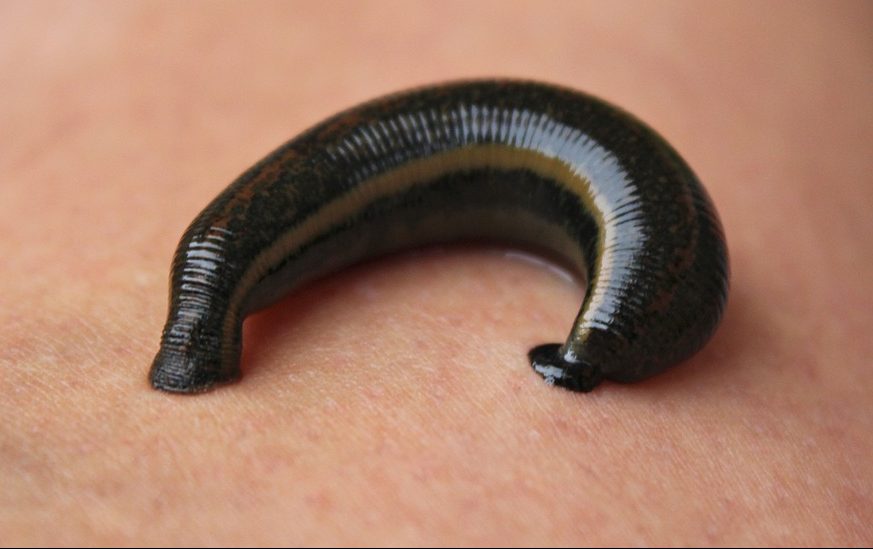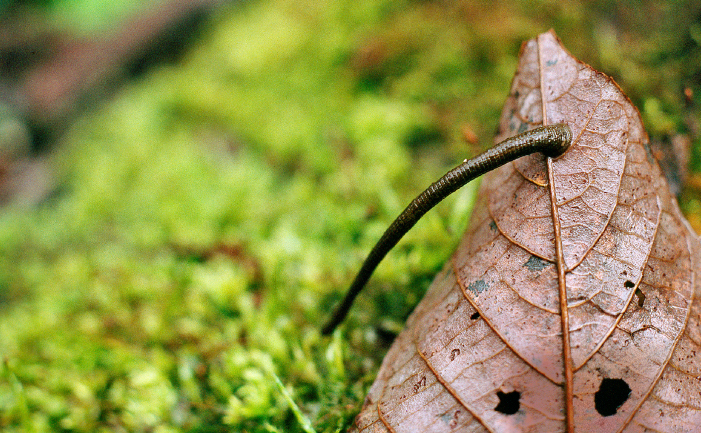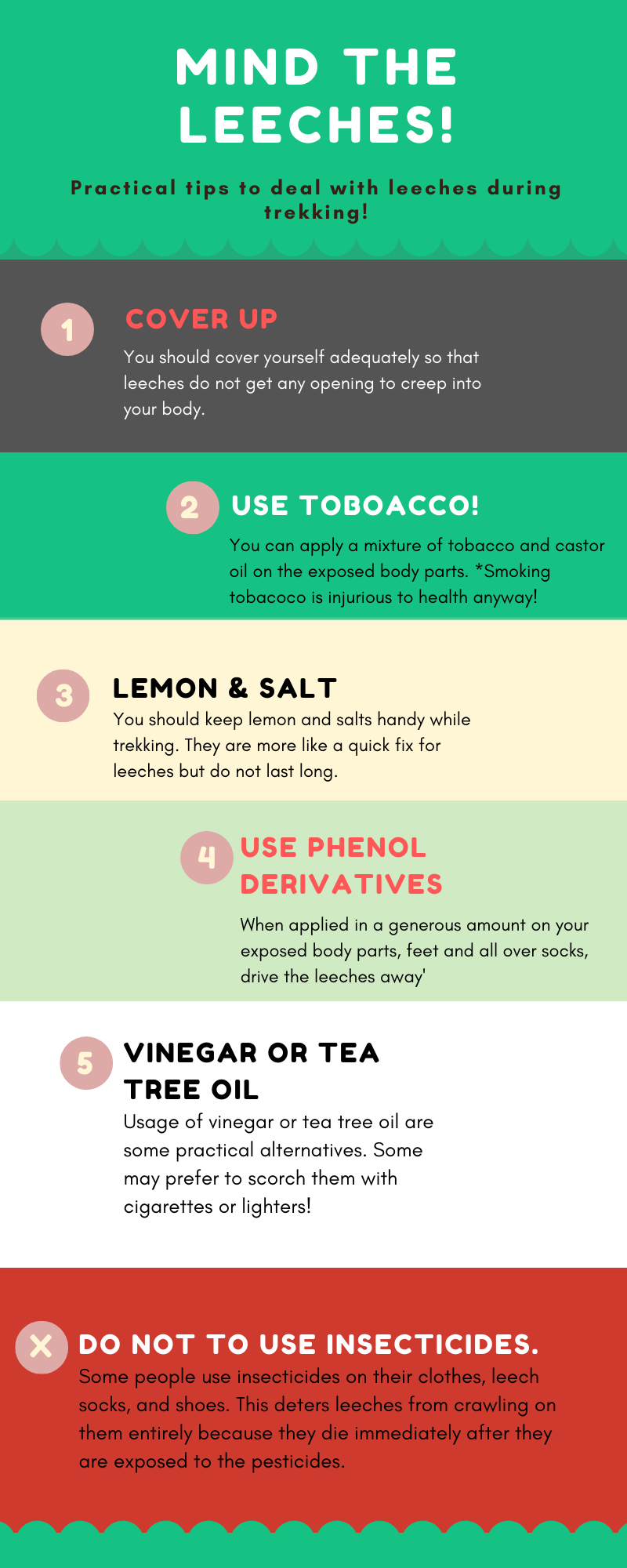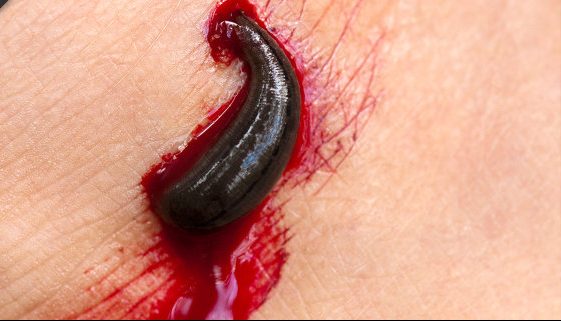Are you afraid of the blood-sucking leeches? Here is the Ultimate Guide on how to Deal With Leeches During Trekking and Hiking!
Trekking is an adventurous way of exploring places typically on foot in which you can take multi-day expedition enjoying the scenery of rural regions, rugged hills & territory, valleys, forts etc. It is a combination of hiking and walking activities. According to some, trekking is like meditation. Climbing up a mountain peak somehow calms you down just as meditation does. For that moment, you just be with yourself and no other feeling can match that calmness and closeness to oneself.
However, if you are trekking during the rainy season or trekking in the rainforests, you need to be careful about leeches. Rainy seasons are not only the best time to trek but also the breeding season for the blood-sucking creature. But, that should not keep you away from trekking. You need to learn about leeches and ways to deal with them. Here are some practical tips to deal with leeches during trekking!
What is a leech?

A leech is a parasitic or predatory worm and is closely related to earthworms. They have a segmented body, which is soft and muscular and can lengthen and contract. They have a small sucker at the anterior end and a large sucker at the posterior end of their body. Leeches range from tiny sizes to about 8 inches in length, even longer when it stretches. They use their 6-inch long proboscis as a needle to suck blood from the host.
Most leeches which attack the human body belongs to the Gnathobdellidae family. Some particular species of leeches have been used for medical purposes since centuries. Some diseases treated with these leeches are mental illness, whooping cough, tumours, skin disease, etc.
Where is it commonly found?
 Â Â Â Â Â Â Â Â Â Â Â Â Â Â Â Â Â Â Â Â Â Â Â Â Image Source
                        Image Source
Leeches primarily occur in freshwater and on land. Aquatic leeches feed on the blood of fishes, birds, amphibians, and mammals. They may eat other small creatures like snails, insect larvae, and worms. Whereas, the land leeches wait for their victims in damp vegetation, poising one end in the air.
Check out the best trekking routes in Kerala.
How to avoid Leeches during Trekking
Before knowing how to avoid leeches, you should know that when a leech bites you, you don’t feel anything. This happens because they inject an anaesthetic and an anticoagulant into your blood. The anaesthetic keeps you from feeling any pain whereas the anticoagulant does not allow your blood to clot, which makes it easier for the leech to suck your blood. They continue to suck blood from your body until they become plump and drop off from your body automatically.
When you find a leech on your body, there is no need to panic. You need to apply some salt on that spot, and the leech will be gone. The bitten place may bleed for some time due to the effect of the anticoagulant of the leech. However, it will stop after some time.
To avoid leeches during trekking, you can adopt the preventive measures listed below:
- You should cover yourself adequately so that leeches do not get any opening to creep into your body. Shirts should be tucked in to prevent leeches from crawling to your armpits or belly. Before entering rooms or tents, you should always inspect all your clothes. This should be must-do thing to avoid leeches after your trekking.
- You can apply a mixture of tobacco and castor oil on the exposed body parts. This is a simple method to avoid leeches during trekking.
- You should keep lemon and salts handy while trekking. They are more like a quick fix for leeches during trekking but do not last long.
- Dettol, when applied in a generous amount on your exposed body parts, feet and all over socks, drives the leeches away due to its phenol derivatives. Having some phenol derivate will surely come handy to avoid leeches during trekking.
- Usage of vinegar or tea tree oil is some practical alternatives. Some may prefer to scorch them with cigarettes or lighters! Otherwise, pull the little bloodsuckers off with your hand!
- You can also wear leech socks while trekking. These socks are long socks tied on top. However, if you don’t wear them appropriately, they would not work. First, you need to wear a thick pair of socks and a high pair of trekking boots. Then, pull up the leech socks above your pants, closer to your knees, and tie them up.
The above-given tips will surely help you to deal with leeches during trekking.
What NOT to Do and Why?
However, try NOT to use insecticides. Some people use insecticides on their clothes, leech socks, and shoes. This deters leeches from crawling on them entirely because they die immediately after they are exposed to the pesticides.
Although it may sound like an ultimate solution, we should not forget that each organism has a role to play in the food chain. Certain birds prey on them. The mass killing of leeches would mean wiping out those birds also. Moreover, coming in contact with insecticides is not good for human health too.

Is there any Problem with Leech Bites?

If you are wondering how bad a leech bite can be or what are the problems with a leech bite, let me tell you that it depends on how many leeches are feasting on you and where they have bitten.
However, you don’t need to worry much if you are a healthy person and get just one leech bite. You will only have some bleeding, and then things will be fine. But, if many leeches bite you at the same time, the consequences can be severe.
Leeches generally feed for about half an hour before getting plump and dropping off the body. Bleeding from leech bite can last up to ten hours on an average. Sometimes, in some worst cases, it may even continue for days.
Leeches can also spread diseases if it has bacteria in its gut and it attaches to you. If you try to remove a leech by violent means, it can puke up germ-filled blood. The medicinal leeches may also pass on bacterial infection of the skin.
Moreover, never itch on a leech bite. That will only make you wound worse. To avoid the irritation, you may use anti-itching agents.
Leeches are a common problem that trekkers encounter at some point or the other. However, after knowing all about leeches and the preventive measures to avoid them, you should be able to deal with leeches during trekking. They would not keep you from trekking anymore.
Happy Trekking! Live and let live:)
Check out my blog on Common health issues and remedies while travelling.


